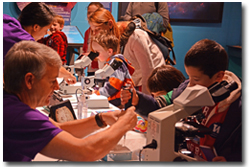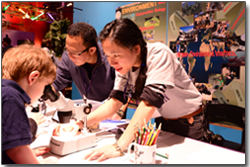Center hosts science exhibit at the 2014 UW “Paws-On-Science”

Prof Randy Kyes and Dr. Elle Kyes (lt) demonstrating
field sampling methods with children at the 2014
UW
Paws-On-Science festival. |
The Center for Global Field Study recently hosted an exhibit
entitled “Animals and Your Health” at UW’s annual science
festival “PAWS-on-Science” (April 4th – 6th
2014) held at the Pacific Science Center in Seattle.
The exhibit provided information for children (K-12) on
methods used to study animals in the wild and included
hands-on activities with some of the equipment and
techniques used by researchers in the field. Children had
opportunities to learn about radio telemetry, trap cameras,
bio-indicator species, and biological sample collection.
|
“This exhibit is intended to demonstrate the close relationship
between humans and the environment and how animals can provide the
first indication of a decline in environmental health and the
related implications for global health” said Randy Kyes, Director of
the Center for Global Field Study, Research Professor in Psychology
and Core Scientist in the WaNPRC.
|
“One of the exhibit activities that is always a real hit is
a hands-on demonstration of primate fecal sample collection
to look for intestinal parasites,” Kyes said. “Of course no
real fecal samples are used, but the fake ‘pooh’ attracts a
lot of interest.”
This is the third year the Center has participated in this
STEM-based educational outreach festival. The exhibit was
also staffed by Dr. Pensri Kyes, Affiliated Scientist in the
Center for Global Field Study and Dr. Entang Iskandar,
Postdoctoral Fellow with the Center and a Senior Research
Scientist from the Primate Research Center at Bogor
Agricultural University in Indonesia.
More than 11,000 people attended the three-day outreach event
which showcased almost 50 UW research groups.
|

Dr. Entang
Iskandar (center) and Dr. Elle Kyes (rt) explaining how
aquatic insects function as
bioindicators of healthy water
systems
at the 2014 UW Paws-On-Science festival.
|



